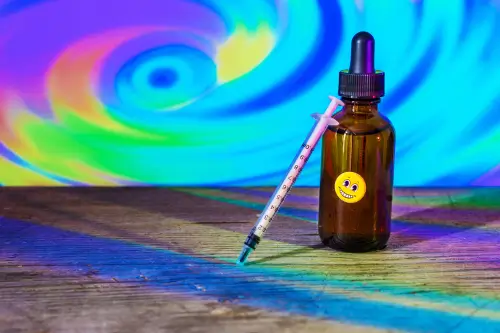If you want to know if you can overdose on LSD, this article is for you. LSD is a psychedelic drug often experimented with by individuals seeking its intense hallucinogenic effects. Yet, many fail to educate themselves on the potential negative outcomes of its abuse, including the risk of overdose and death.
Once you’ve finished this blog, you’ll learn why LSD’s chemicals do not directly cause a fatal overdose, the difference between an overdose and a bad trip, and if you can become addicted to LSD.
What Is LSD?
LSD (lysergic acid diethylamide), also known as “acid,” is a potent psychedelic substance that falls under the category of hallucinogens. These drugs induce non-ordinary states of consciousness and cause hallucinations and perceptions not based on reality. LSD is derived from lysergic acid found in the ergot fungus that grows on grains and is illegally manufactured and sold in various forms, such as pills, gelatin squares, or soaked blotter paper.
LSD trips can last up to 12 hours and produce a range of experiences, from euphoria to terror. Users may hear sounds, feel sensations, and see things that are not real. A “good trip” lasts about 12 hours, but a “bad trip” may last much longer and can produce unexpected behavior. These experiences can result in unpredictable behavior, excessive sweating, feeling hot to the touch, and extreme visual changes that are difficult to control.

Can You Overdose On LSD?
While there are reported cases of users hurting themselves or engaging in reckless activities that lead to death, only two cases directly link LSD’s chemicals to a fatality. Some new reports have suggested “LSD toxicity” in cases of sudden death. However, only two of these fatalities were due to massive overdoses. The other two were due to fatal cardiovascular collapse following aggressive physical restraint from police, and one was caused by a different drug that affects central nervous system temperature regulation. Physiologically, LSD is considered non-toxic and safe when taken within standard dosages of 50-200 micrograms.

Why The Effects Of LSD Are Unpredictable
The effects of LSD are unpredictable because of how the drug interacts with each individual’s brain, the current state of mental health, and existing health conditions. Recent studies highlighted different and possibly beneficial results in individuals who accidentally consumed higher doses of LSD.
- One case report shows sustained improvements in mood symptoms, including reductions in mania with psychotic features, following an accidental LSD overdose almost 20 years ago.
- A second case describes how an accidental LSD overdose in the first trimester of pregnancy did not negatively affect the course of the pregnancy or have any obvious negative effects on the child’s development.
- Another report suggests that intranasal ingestion of 550 times the normal recreational dosage of LSD was not fatal and had positive effects on the individual’s pain levels and helped her withdraw from morphine.
- One study reported an accidental ingestion of 1,000-1,200 micrograms of LSD led to hospitalization for a 15-year-old, while a 26-year-old who consumed 500 micrograms didn’t require hospitalization.
- Another case involved a woman who accidentally snorted 55 milligrams of LSD, about 550 times more than a typical tab, which caused vomiting and memory loss but not medical attention.
Older research estimated that a lethal dose of LSD for humans could be around 14,000 micrograms, but this is less than the amount ingested by the woman in the case above. Because of these mixed results, there is no clear answer on whether or not you can “overdose” on LSD.

A Bad Trip Vs. Death
Differentiating an overdose from a bad acid trip is crucial. A bad trip can manifest in various ways, causing unsettling hallucinations, paranoia, anxiety, depression, psychosis, time distortion, and depersonalization. These effects can impair judgment and lead to risky behaviors, which is where most deaths associated with LSD result from. LSD can also cause physical symptoms such as dry mouth, sweating, coordination issues, and an increased heart rate.
While unpleasant, these symptoms usually do not require medical attention unless they exacerbate an existing condition or result in unsafe behavior.
Can You Become Addicted To LSD?
LSD is a highly debated drug but is not considered addictive for several reasons:
- It does not produce a dopamine high or intoxication like other drugs such as opioids.
- Since each LSD experience is unique, there is no assurance that the user can have a similar experience again.
- LSD does not result in physical dependence or physiological withdrawal symptoms.
- Tolerance to LSD develops quickly, so taking higher doses over consecutive days will not result in the desired effect. A person must take a break from LSD to experience its effects again.
Long-Term Side Effects Of LSD Abuse
Some studies suggest that repeated use of LSD may lead to the following:
- Persistent psychosis: LSD can cause persistent psychosis in some individuals. Symptoms of psychosis may include disordered thinking, paranoia, and visual hallucinations.
- HPPD: Hallucinogen Persisting Perception Disorder (HPPD) is a condition that can develop after using LSD. It is characterized by persistent visual disturbances such as seeing halos, trails, or flashes of light, even when not under the influence of LSD.
- Anxiety and depression: Some people may experience anxiety or depression due to LSD use. These effects can persist for days or weeks after the initial use.
- Flashbacks: Some individuals may experience spontaneous, unwanted recurrences of some of the subjective effects of LSD. This phenomenon is known as a “flashback.”
- Increased risk of mental illness: Some studies suggest that LSD use may increase the risk of developing certain mental illnesses, such as schizophrenia or bipolar disorder, in individuals predisposed to these conditions.

Contact Launch Centers
If you or someone you know is struggling with LSD abuse or wants to know more about addiction treatment plans, contact Launch Centers. LSD and other illegal drugs can affect an individual’s entire life, including their families, careers, and friends. Drug addiction doesn’t need to take over your life, and Launch Centers in Los Angeles is here to help.





